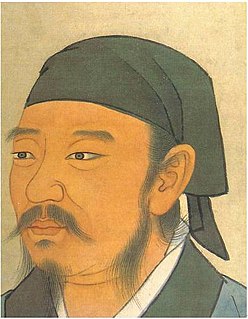A Quote by Luc de Clapiers
We are forced to respect the gifts of nature, which study and fortune cannot give.
Related Quotes
Our minds are forced to become fixed upon different things by an attraction in them which we cannot resist. To control the mind, to place it just where we want it, requires special training. It cannot be done in any other way. In the study of religion the control of the mind is absolutely necessary. We have to turn the mind back upon itself in this study.
To be wealthy, a rich nature is the first requisite and money but the second. To be of a quick and healthy blood, to share in all honorable curiosities, to be rich in admiration and free from envy, to rejoice greatly in the good of others, to love with such generosity of heart that your love is still a dear possession in absence or unkindness-these are the gifts of fortune which money cannot buy, and without which money can buy nothing.
Let us sit and mock the good housewife Fortune from her wheel, that her gifts may henceforth be bestowed equally, I would we could do so for her benefits are mightily misplaced and the bountiful blind girl doth most mistake in her gifts to women. 'Tis true for those that she makes fair she scarce makes honest and those that she makes honest she makes very ill-favouredly. Nay, now thou goest from Fortunes office to Natures. Fortune reigns in gifts of the world, not in the lineaments of Nature.
I assert once again as a truth to which history as a whole bears witness that men may second their fortune, but cannot oppose it; that they may weave its warp, but cannot break it. Yet they should never give up, because there is always hope, though they know not the end and more towards it along roads which cross one another and as yet are unexplored; and since there is hope, they should not despair, no matter what fortune brings or in what travail they find themselves.
My reason taught me that I could not have made one of my own qualities - they were forced upon me by Nature; that my language, religion, and habits were forced upon me by Society; and that I was entirely the child of Nature and Society; that Nature gave the qualities and Society directed them. Thus was I forced, through seeing the error of their foundation, to abandon all belief in every religion which had been taught by man.
You cannot speak that which you do not know. You cannot share that which you do not feel. You cannot translate that which you do not have. And you cannot give that which you do not possess. To give it and to share it, and for it to be effective, you first need to have it. Good communication starts with good preparation.
How shall we define occultism? The word is derived from the Latin occultus, hidden; so that it is the study of the hidden laws of nature. Since all the great laws of nature are in fact working in the invisible world far more than in the visible, occultism involves the acceptance of a much wider view of nature than that which is ordinarily taken. The occultist, then, is a man who studies all the laws of nature that he can reach or of which he can hear, and as a result of his study he identifies himself with these laws and devotes his life to the service of evolution.
He who does not realize to what extent shifting fortune and necessity hold in subjection every human spirit, cannot regard as fellow-creatures nor love as he loves himself those whom chance separated from him by an abyss. The variety of constraints pressing upon man give rise to the illusion of several distinct species that cannot communicate. Only he who has measured the dominion of force, and knows how not to respect it, is capable of love and justice.




































